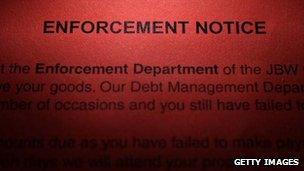Bailiff industry changes proposed by Ministry of Justice
- Published

Bailiffs operating in England and Wales currently need a court certificate to operate
Changes to laws governing bailiffs in England and Wales, such as the creation of a code of conduct, are being proposed by the Ministry of Justice.
Justice Minister Jonathan Djanogly told the BBC clarity was needed about what bailiffs were legally allowed to do and how people could report wrongdoing.
The proposals would include a ban on the use of force and detail what items bailiffs can and cannot take.
Companies, councils and courts use bailiffs to collect money owed to them.
However, there have been many complaints and concerns about the practices of a minority within the industry.
The government said it fears people do not have enough protection from the rogue practices of aggressive bailiffs.
And Mr Djanogly said the government had heard of rogue bailiffs carrying out "very bad behaviour".
"I mean knocking on people's doors in the middle of the night, going to people's homes when there are only children in, but a lot of it is to do with the fact that a lot of people don't know what to expect," he said.
He added: "If we have a code, backed up by statute, where people know where they stand, then we think that a lot of these problems will go away."
The proposals, expected to be unveiled later, include a new regulatory body to oversee the industry, a new complaints process for debtors and clear fees so that people know what bailiffs can charge.
Many firms have welcomed the attempt to deal with rogue practices and say the suggestion of a regulatory body with a clear complaints process will help build the reputation of the industry.
Bailiffs in England and Wales currently need a court certificate to operate.
The law is different In Northern Ireland and Scotland.
There are no bailiffs as such, although individuals are appointed by courts to recover debts.